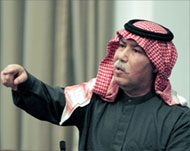Documents link Saddam to massacre
The chief prosecutor in Saddam Hussein’s trial read out documents in court on Tuesday which he said established that the former Iraqi leader signed a death warrant for 148 people.

Jaafar al-Moussawi said the document was dated 14 June, 1984 and signed by Awad al-Bandar, chief of the Revolutionary Court and his co-accused, and approved by the former president.
“This document condemns the 148 victims to hanging until death,” Moussawi told the court.
Saddam and seven others are charged with crimes against humanity in connection with the execution of 148 villagers from Dujail after an assassination attempt on him there in 1982.
Prosecutors hope such documents can establish a direct link between Saddam and atrocities by proving a chain of command.
|
“This document condemns the 148 victims to hanging until death” Jaafar al-Moussawi, the chief prosecutor |
Saddam’s trial was again thrown into disarray when his top defence lawyers walked out after their pleas for an adjournment and the removal of the judge were rejected.
Khalil al-Dulaimi, chief defence attorney and Khamis al-Obeidi, his deputy, staged another walkout after their attempts to win an adjournment and the expulsion of Raouf Abdel-Rahman, the chief judge, on grounds of bias were turned down.
Their latest protest came minutes after they lifted a boycott and returned to the chamber. After three hours of proceedings the trial was adjourned until Wednesday.
Father’s shrine
During the hearing both the chief judge and Saddam questioned the authenticity of the hand-written documents presented to the chamber on Tuesday.
 |
|
Barzan al-Tikriti engaged in verbal |
Another document dated 16 June, which Moussawi said was signed by Saddam, read: “We approved the verdict of the Revolutionary Court of hanging until death for the 148 criminals.”
Before the latest court drama, a bomb attack damaged a shrine Saddam had built over his father’s grave in Tikrit, the ex-president’s hometown north of Baghdad.
Moussawi presented another document dated 23 September, 1987, which he said came from the Intelligence Court and said: “Ninety-six people were executed on this day.”
“Forty-six were killed during interrogation, according to the documents that I have read to you,” said Moussawi, a member of the Shi’ite sect oppressed by Saddam for decades.
The documents were displayed on screens in the court.
Barzan al-Tikriti, Saddam’s half-brother and former intelligence chief engaged in a verbal exchange with Judge Abdel-Rahman, whose impartiality has been questioned by the defence because he is a Kurd from Halabja, a Kurdish village allegedly gassed by the former Iraqi leader’s forces in 1988.
“This is supposed to be a court, not the law of the jungle,” said Barzan, once one of the most feared officials in Saddam’s Iraq. “Shut up and sit down,” Abdel-Rahman told Barzan, who was once the Iraqi representative to the United Nations in Geneva.
Saddam subdued
 |
|
Saddam’s lawyers said he ended |
Officials said court-appointed lawyers would defend Saddam, as they had done since a previous walkout by his defence team a month ago.
Saddam, 68, who could face death by hanging if convicted, was subdued compared to previous sessions dominated by his tirades condemning the court as an illegal creation of the US occupation.
Saddam ended a hunger strike for “health reasons”, lawyers said, before returning to the trial that has been troubled by charges of political bias and killings of two defence attorneys.
Moussawi read from another document which said four men were hanged by mistake and two of the convicted were freed by mistake. He then presented a section of the document which quoted Saddam as writing: “Fate released that pair. Fate is not more merciful than us so I forgive them.”
Prosecutors chose to try and convict Saddam on the Dujail case first because it was expected to offer evidence that he played a direct role in crimes against humanity, but witness accounts have been overshadowed by mayhem in the trial.